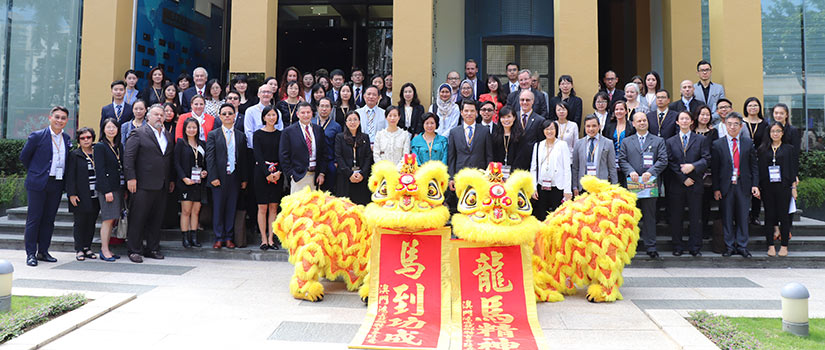By: Bryony Wardell, wardellb@mailbox.sc.edu
Posted on: December 13, 2018
What did you buy the last time you were at the airport? The billion-dollar airport retail economy is just one example of the symbiotic relationship between tourism and retail, and academic leaders are putting that nexus at the forefront of research innovation.
Thought leaders from around the world came together in Macau, China, this month at the inaugural International Conference on Tourism and Retail Management, TRMC2018. The conference established a new network of interdisciplinary knowledge and collaboration dedicated to the integration and advancement of retail and tourism management.
The conference was jointly organized by The Institute for Tourism Studies (IFT) in Macau; the University of South Carolina’s College of Hospitality, Retail and Sport Management (HRSM); and Nankai University’s College of Tourism and Service Management based in Tianjin, mainland China.
“A forum was needed, on an international scale, to bring scholars together on a mission to address the growing research needs for these borderless fields,” says Haemoon Oh, dean of the College of HRSM. “The partner institutions created this conference to break new ground and to synergize and elevate the impact we can collectively make in these two dynamic industries.”
IFT hosted the 2018 conference December 2-4, and drew scholars from 12 countries and regions to share their latest research and exchange new ideas. Keynote addresses covered topics ranging from complexities in travel-related behavior, to education innovation in a digital era, to the new hyper-personalization luxury market.
A delegation of 11 faculty and staff from the College of HRSM attended and presented at the conference. Highlighted presentations by College of HRSM faculty, include:
- "Off the scale behavior: Surfacing complexities of visitors’ travel-related behavior using marketing anthropology research methods" — keynote address presented by Drew Martin, School of Hotel, Restaurant and Tourism Management chair.
- "The new 'hyper-personalization' luxury market: Using a customer’s DNA in consumer goods industries" — keynote address presented by Mark Rosenbaum, Department of Retailing chair.
- "May I serve you? Effective hotel advertising via hotel brand anthropomorphism" — presented by Haemoon Oh, College of HRSM Dean.
- "Review of leadership research in tourism: Analysis and suggestions for future research" — presented by Kawon “Kathy” Kim, School of Hotel, Restaurant and Tourism Management
- "The role of government in destination competitiveness: The TALC model perspective" — presented by Marketa Kubickova, School of Hotel, Restaurant and Tourism Management
- "Surfacing antecedents of employee longevity in fine dining restaurants" — presented by Drew Martin
- "Making customer reviews useful and/or enjoyable? The impacts of temporal, explanatory, and sensory cues on consumers’ evaluations of online reviews" — presented by Fang Meng, School of Hotel, Restaurant and Tourism Management
- "A latent profile analysis of customer engagement: Findings from multiple studies" — presented by Kevin So, School of Hotel, Restaurant and Tourism Management
- "Customer experience at integrated resorts: Evidence from online travel reviews" — presented by Jiyeon Kim, Department of Retailing
The event also included pertinent panel discussions moderated by Martin and Meng, and sparked discussion relevant to academics, industry leaders and consumers alike.
For example, how can tourism-based businesses better serve travelers by providing one-of-a-kind shopping opportunities that Amazon can’t replicate? By envisioning retail establishments as tourist destinations, even retail theme parks, businesses have the opportunity to engage travelers and build a cohesive destination marketing package in partnership with hotels, restaurants and entertainment venues that make up a destination’s tourism ecosystem.
The scholarly event embodied the important role of international, interdisciplinary collaboration in the continued and sustainable growth of service economies. And, it now provides a platform for continued innovation in the years ahead.
The topical coverage is envisioned to gradually expand, while keeping a sage focus on the intersection of retail and tourism and building new opportunities for industry engagement.
"We are not looking to make a huge conference, but rather to provide a one-of-a-kind venue and forum for exchanging cutting-edge thoughts and research results," says Oh.
The conference is planned to be held annually, with the host location rotating among the three partner schools. Nankai University will host for the 2019 conference.
